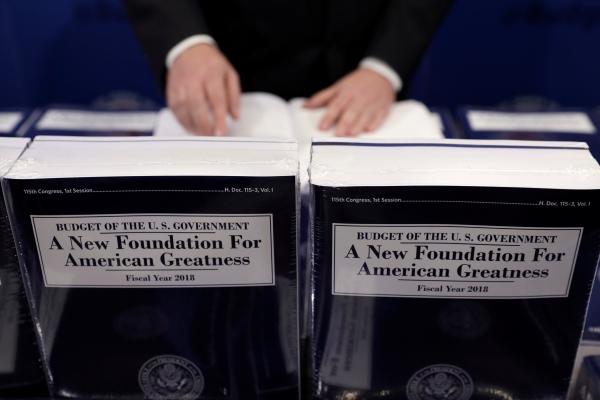Several years ago, Sojourners asked that question, leading a campaign to remind our leaders in Washington that: “A budget is a moral document. Our faith tells us that the moral test of a society is how it treats the poor. As a country, we face difficult choices, but whether or not we defend vulnerable people should not be one of them.”
As we look at the priorities outlined in the Trump administration’s 2018 budget released today, it’s worth asking again: What would Jesus cut?
We know what Donald Trump would cut. His budget calls for more than $800 billion in cuts to Medicaid, which takes away health care from about 10 million people. His budget would slash the Children’s Health Insurance Program, the Social Security Disability Insurance program, Meals on Wheels, and federal funding for Habitat for Humanity. It would worsen hunger in America by cutting SNAP (formerly food stamps) by more than 25 percent and eliminating federal funding for subsidized school lunches.
Before he began his public ministry, Jesus fasted for 40 days. When he returned to Galilee, he proclaimed in his first sermon that “The Spirit of the Lord is upon me, because he has anointed me to bring good news to the poor.” The word in the original language for “good news” is “evangel” from which we get the word “evangelical.” So as an evangelical, I know that good news to the poor is at the core of Jesus’ message.
The budget released by the Trump administration is anything but “good news” for the poor. It would be terrible news for those whom Jesus called “the least of these,” the central focus in his final sermon that also calls upon “the nations” to protect the most vulnerable.
Leaders in the faith community must stand up to these deeply flawed priorities, to say that the choice to protect the rich instead of the poor in the name of deficit reduction is an immoral one. Demonizing the poor and slashing programs that benefit low-income people — while refusing to scrutinize the much larger subsidies we provide to the wealthy — is hypocritical and cruel.
Many of us, across our Christian families, believe that global health programs that save children’s lives and food aid to nations about to experience famines are more important to Jesus than tax cuts for the rich.
President Trump calls for a $43 billion increase in military funding next year, reversing the biblical instruction to beat our swords into plowshares. Instead, the proposed budget cuts would beat plowshares into more swords.
Some argue that the biblical mandate to protect the poor is meant to apply only to individuals, or to the church – not to governments. The Scriptures say otherwise. In the Old Testament, the biblical prophets consistently condemn injustice to the poor and frequently follow their statements by requiring the king (the government) to act justly. That prophetic expectation did not apply only to the kings of Israel but was also extended to the kings of neighboring lands and peoples.
Jeremiah, speaking of King Josiah, said, "He defended the cause of the poor and needy, and so all went well." The prophet Amos speaks directly to the courts (and government) when he says, "Hate evil, love good; maintain justice in the courts" (Amos 5:15 NIV).
Psalm 72 begins with a prayer for kings or political leaders: "Give the king your justice, O God, and your righteousness to a king's son. May he judge your people with righteousness, and your poor with justice. May the mountains yield prosperity for the people, and the hills, in righteousness. May he defend the cause of the poor of the people, give deliverance to the needy, and crush the oppressor.”
Of course, the Bible doesn’t mandate specific programs or prescribe a specific level of funding for them. Jesus is not serving on the Appropriations Committee. We as Christian individuals – and we as a nation – will be judged by our actions. We should all commit to improving the effectiveness of government programs, including those serving the poor.
But the budget released today is not an attempt at reform; it’s a heartless knife-slash to those who are struggling just to feed themselves and their families. The priorities of this budget are not consistent with Christian, Jewish, or Muslim values. They are not only bad economics, they are also bad religion; as we say in the evangelical community they are unbiblical.
It is now up to Congress to set their own priorities and to present their own budgets. It is therefore time once again to ask our elected officials – especially those who call themselves people of faith: What would Jesus cut?
Got something to say about what you're reading? We value your feedback!





